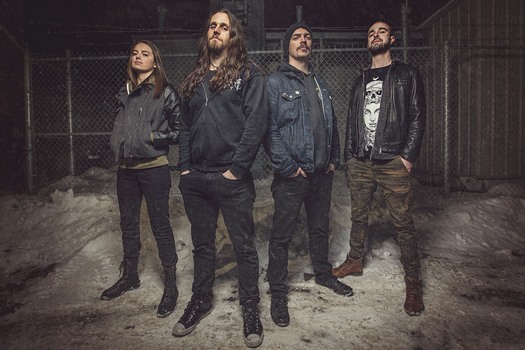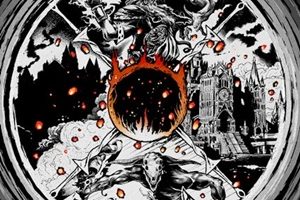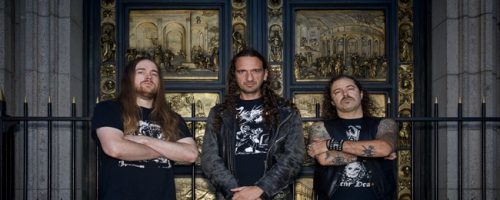Illyrian – Crushing Dark Souls
Thursday, 21st October 2021
Evolving out of the ashes of Hellborn Death Engines in 2015 into Illyrian, this Canadian act from Calgary infuses a thrash platform with some intricate progressive, groove, and death inflections. Previously issuing two full-length albums, their latest EP Aegis is their first foray into a concept effort – tackling the Dark Souls video game as inspiration around these four tracks. You can expect vicious riffing, sick transitions, a bevy of screaming/growl switch-ups, and this energetic combustion from first note to last – rivalling a lot of the contemporaries currently at headlining ranks in the scene.
We reached out to bassist Jeff Perry and he was happy to bring us into the realm of Illyrian. You’ll learn more about his passion for Dark Souls, lineup changes and future evolution of the group as a result, thoughts behind their social media use and consideration for labels versus DIY promotion – plus insights into PR, beginner band missteps/corrections, and the importance of acts like The Black Dahlia Murder, Revocation, and Lazarus A.D. to their sound.
Dead Rhetoric: Aegis is the latest record for Illyrian. How did this set of material come together, and where do you see the evolution of the band for this outing compared to your two previous albums?
Jeff Perry: Illyrian – one of the cornerstones for what we do, especially lyrically, is we intentionally don’t do socio-political things. A lot of our material is going to be about video games, or comic books, the works that we like as a band. Video games in particular is something near and dear to my heart. This record I wrote myself, and I wanted to try our hand at doing a concept album. We had never done that before and had the idea after starting to get into the material – maybe a concept EP would be easier to approach in the scope. That’s the basis as of it – now what story did I want to talk about? The video game I picked is Dark Souls – which is a fairly popular video game that came out about a decade ago. One that is very personal to me and to a lot of other people, it’s about strife and overcoming a large challenge. It has a nuanced story that isn’t very in your face, I took one character and told the story through him.
In that sense, it is taking the same concept of a fictional narrative through video games, comic books, and doing it with a little more focus. Previously we had two writers in the band – Scott one of the guitar players, and we had another guitar player in the band. Our music would be between the two of them – now that individual is no longer with the band and Scott did all of the writing on Aegis as a result. We go for a thrash/death sound – this one goes more into the death metal side of things. I don’t know if we will stay there necessarily, but this time around we decided to turn the death metal thing up to eleven and see where it goes. The musicianship and songwriting really leans into that style this time.
Dead Rhetoric: Were you working in parallel with Scott’s musical compositions because this was a concept effort?
Perry: Yes and no. By the time we had arrived at wanting to do a concept EP, we had written a couple of songs. Actually one of the songs we ended up shelving and picking a different one. We thought the newer song had more of that Dark Souls vibe to it. He had written the music in the order I had envisioned it, which typically doesn’t happen. We figured out the drums, the bass, the guitars, and then towards the end I would come in to do the lyrics on top of that. For the most part, Scott came up the solid foundation and then I would add the vocals on top. Through the process we got to the final product.
Dead Rhetoric: Lyrically the EP tackles one of your favorite video games – Dark Souls. What made this game fascinating to you enough to develop the storyline and convert those themes into Illyrian songs?
Perry: This isn’t really indicative of why the band did it, but more why I wanted to do this personally. I remember when the video game came out, I was in my early twenties – I grew up being that quiet, nerdy kid who just wanted to play video games. I didn’t have a lot of friends. In the 2010’s, a lot of video games felt like they were handholding – I don’t mean to say in a gatekeeping sense, but there were a lot of games that were like Disneyland rides. Here’s your experience, this thing, you will see a spectacle like an interactive movie. And that has its place, but I was feeling burned out from that. I was going through some mental things, and Dark Souls comes along to throw a game at you in the face of all that. It was old school, toss you in, we aren’t going to tell you a damn thing, and it’s part of its charm. It made quite a wave for people when it came out. The old school gamers were looking for an older return to form game. Finally we get to play a game that respects us as players. We will figure it out, we are okay with struggles, challenges, and overcoming. It could be frustrating, but then when you win, that win is so much sweeter. It sits with you.
Through that process, I don’t want to be overly romantic about it, but you learn something about yourself. You sit with the struggles, and there is something to do about that mastery and having some control over that, having your input to overcome and triumph. The emotions stuck with me, and to this day it’s still one of my favorite video games. And writing a metal album about it, I can check that box off the list.
Dead Rhetoric: You infuse your thrash metal sound with aspects of progressive, death, and folk influences. What do you consider as key elements when it comes to composing and execution to finally get to the ideal Illyrian style or sound?
Perry: Scott will do a lot of the writing as far as the instruments go, then bring it to us as a band and we go through it at that point. We don’t go in thinking ‘that doesn’t sound very Illyrian to us’. We are more like the riff doesn’t sound good right there, or the momentum of the song is disrupted by putting this there. We take it at the point of each song being its own thing, as it stands on its own. Its important that a song stands in concert to the rest of a record. A lot of digesting music these days is by listening to one track on Spotify, one track on playlist, you get one shot at that. A song really has to be its own thing. We have a lot of songs that we tinker with, and have variations, and they don’t end up making it onto a record. It’s not that they are bad songs, we just have better songs that make the record.
That’s more or less the metric we use. It’s one of those gut feelings. I mention the song we didn’t have make the EP in the end. We ended up replacing it with what became “Age of Fire”. We finished it, and Scott started writing this for our next album. I thought this song was better than the song we were going to use for the EP, we took that song off. I am glad we did that. The other one is probably not even going to be on the next album, it will sit on the shelf. That is sort of how we approach things.
Dead Rhetoric: You recently announced on social media changes that will be taking place in your lineup, especially drummer Darren May who has been with the band over six and a half years. Can you bring us up to speed on these changes and how you believe this will change or effect the band moving forward?
Perry: Those are big things, no doubt about it. We are losing two members, half of our lineup is done as of ten days from now. We will be playing a hometown show in Calgary, that will be our EP release show. That will be their farewell show. Kelly has been with us since the December before COVID-19. We didn’t have that time to tour with her, and the pandemic was what it was for her and other musicians. In her case and Darren’s, the pandemic really showed us where our priorities are. We understand what we want to work towards, the band can be a contrast to those things. They want to pursue other things, there is no ill will about that. Scott and I will continue to carry things on, that is something we have looked at. The two of us want to keep going, we will be auditioning guitar players and drummers. For now it will be a studio project, so producing new material and recording we can do that and write a whole album between the two of us and find people along the way.
Admittedly, both those lineup changes are fairly new announcements – about four to six weeks ago. We are not at a point of where our five-step plan would be as to where we will be. Our heart is still in it, we aren’t done, and I’m excited to see what happens. In Darren’s case, as you said he’s been with us almost seven years and being in a band is a lot like being in a relationship. You really get to know people, especially when you are on the road with them. Darren is our brother.
Dead Rhetoric: Discuss the importance of social media and the interaction with your community of fans/followers in developing a bigger footprint of your sound not only on a local basis but internationally?
Perry: I am probably the worst member of the band to ask this question to. I don’t have social media. I find it as a necessary evil. I’m not going to hate on it. It’s not my particular bag or cup of tea. I can’t speak to the tactics, Scott is more involved in that. I find we had some lightning in a bottle. We had this idea to do these little skits, 30 second to one-minute videos which were funny for promotion. Honestly, those videos drew more interest sometimes than our music. We joked that if it doesn’t work out as musicians, we’ll just do standup instead. We found it gives us more interaction with our audience when we do shows, they knew we were funny and loved seeing those videos on our channels. I think it’s a lot of fun. It’s a happy accident as it were.
Dead Rhetoric: How would you describe what Illyrian is like when it comes to the live show experience? What do you hope audiences take away from your performance, and what have been some of the more memorable shows to date?
Perry: Our mantra has always been not to be super serious. We are professionals, but in a performance context we are there to have fun. We make a big point to have an energetic stage show. To the point that we have written music that sometimes may be a little too technical. It requires a lot of thinking, and there’s a place for that. We find a balance between technicality while being engaging to the audience as performers.
We like to do crowd engagement as much as we can. I recall one show in which we have this part of a song that is a salsa breakdown, a Latin part in it. We pulled two members of the crowd onstage and gave them a cowbell and a tambourine. Of course, I pick out the two drunkest dudes in the audience – which in hindsight may not have been my best move. But it was hilarious. The one guy got up there, ripped his shirt off, and banged this cowbell not on beat but had the time of his life. I think that’s really funny, and people comment about the show from three or four years ago.
Dead Rhetoric: What’s the scene like for heavy metal in your part of Calgary, Alberta/ Canada? Do you have strong support on a local level, and are there specific styles/bands that the fans gravitate to more, or are all sub-genres given an equal chance?
Perry: We have a decent scene. In Western Canada, the big three cities are Calgary, Edmonton, and Vancouver. There are some cities in between like Kelowna, they have a very cool scene. Each of the big three has their own sound and style. Calgary has a throwback sound, a lot of the early thrash sound. A sub-scene to the scene here. I wouldn’t say it’s the only thing in the scene. In Vancouver there is a lot of death metal. There are some folk bands there too, with the costumes, world instruments. A lot of us came from the thrash sound, so that’s why it’s still there. We have evolved, but I think that’s part of the reason why we do well here locally. By and large, everyone gets along.
Dead Rhetoric: What do you see are some common mistakes or missteps that younger musicians/bands make in the metal scene that you wish they would think harder about or avoid? And how has Illyrian handled setbacks or missteps yourselves in your career – have these lessons made you stronger as a unit in the long run?
Perry: I think a really easy one for new bands I see not doing is when playing live. If you are a new band, playing first on the bill of four bands, you will see that band plays, their buddies show up, and everybody including the band leaves. We understand that can happen once in a while, people have lives, but it goes a long way to have one or two members – if not all – staying around for the rest of the bands. Stick around, other bands notice that. You are losing out on a networking opportunity. You can get feedback, people can give you a high five, more merch sales. I think that’s very important. This scene a lot of times is about who you know. Every band that is playing with us for our CD release show are bands we have met by playing shows. That’s how this whole network works for us at a local level. We want to support our friends.
PR is a mysterious black hole for us. You have to invest money in PR, it is about that network, and your PR representative has relationships with people so there is something about that to know. You have to understand it’s not a matter of throw money, get x results. What are your channels that you get feedback through? How do you deal with the engagement from that? I can think of a really good example of that by ending up on the front page of Metal Sucks. Super cool – what an honor to end up on this website that I’ve been following for years and years. I could not tell you what that got us at a statistical level. Things like that may look impressive on paper – we start looking at what works for us, what didn’t. We are still going to work with PR, but we have to have a better plan. You get a lot more fruitful results, what is involved into getting onto Spotify, playlists, things that mean something versus paying to get a hundred likes. Learning all of that knowledge, it’s not an easy answer. Scott is a lot better than that than I am. It’s marketing 101, and it’s very easy to throw a lot of money at but not get the desired results.
Dead Rhetoric: What are some hobbies, interests, and passions that you pursue outside of music when you have the free time and energy to do so? And how does the band balance out the workload with music activities against work/day jobs and personal relationships/families/friends?
Perry: As mentioned I am a big gamer. I love to do this. All of us are in our thirties, well into our careers, hitting reset and setting on new paths. This question is a little fluid. There are months that we can dedicate a lot of time to music, and that’s great. We try to get together at least once a week, sometimes twice a week. Like everything in life, sometimes personal lives get in the way, travel for work, personal stuff. Mental health has also been important. Having to reestablish boundaries, be patient, it’s not normal what we are going through with the pandemic. I think as far as the band goes, it’s a lot like a relationship. You have to give it time, go through things together, clear communication, understanding, and making sure you show up. I have had my ups and downs too, and the band has been great through this time.
Dead Rhetoric: How do you assess the career arc of Illyrian from your inception to the current days? Are you content to remain focused on releasing material as necessary independently, or would you ever consider signing to a record label?
Perry: Labels are something that we have definitely considered. We have been courted by a couple of labels in the past, and it wasn’t quite the right fit. We want to do this to be fairly self-produced and self-sufficient. We have to watch for things as a less known tier band, there are some gotchas that can really mess bands up. We’ve always done our due diligence. We want to make sure it’s more than what can this label do for us, we want it to be a partnership.
We want to push in a professional direction. If we got to a label position, would we want to do a lot of touring? It’s a lot of financial investment to keep things going. It’s all about finding that balance, and Scott and I are very interested in working with a label if it fit on a larger scale.
Dead Rhetoric: Name three bands that have had the greatest impact to your viewpoints and respect for the metal genre – and what has been the best concert memory you’ve had, purely from a fan perspective – and what made that so special to you?
Perry: I’ll answer the first one, and hopefully as I’m thinking about it, I’ll come up with an answer to the second one. There are three that come off from an influence perspective. Those bands would be The Black Dahlia Murder, Revocation, and Lazarus A.D. Particularly in Scott’s wheelhouse, we’ve had some people listen to the music and think ‘this is very much like The Black Dahlia Murder’. Scott takes lessons with Dave Davidson from Revocation, so there is a signature style and they talk about songwriting. Lazarus A.D. is sort of an older reference, but when we first started out with Scott doing more of his thrash vocals, their vocalist was a major inspiration. We saw their success and how they did things. Dahlia tours like 300 dates a year. What does it look like for a band like that to make it that has families? Not only from a musical influence, but we look at them from the professional progression.
The concert memory I’m blanking. There are so many that come to mind, there isn’t one that stands out. I haven’t seen a show in a while.
Dead Rhetoric: What’s on the agenda for Illyrian over the next twelve months? Are there any other side projects, guest appearances on other records we may be on the lookout for – and how do you see things looking for live shows as restrictions lift from the pandemic?
Perry: Given we are losing two members, the twelve-month plan that we had a month ago is now a very different plan. We have talked about one of the new songs we have been working on, Darren has this big drum part in it, and we may release it as a single in late 2021 or early 2022 as a swansong/ send off for him. You may see a single come out. Beyond that, live shows without a full band (are) not going to be something we can capitalize on. We will be looking into getting a new drummer and guitarist. Shows at large, the passports are happening. It’s a great idea, it’s a very clear line of what you need to do to get to shows. It can generate better revenue for bands and venues. I hope it continues to work in a safe way. I don’t think any of us thought we would be doing this eighteen months into it. We have to live with it and deal with it – not just bands and bars, but everybody.
























